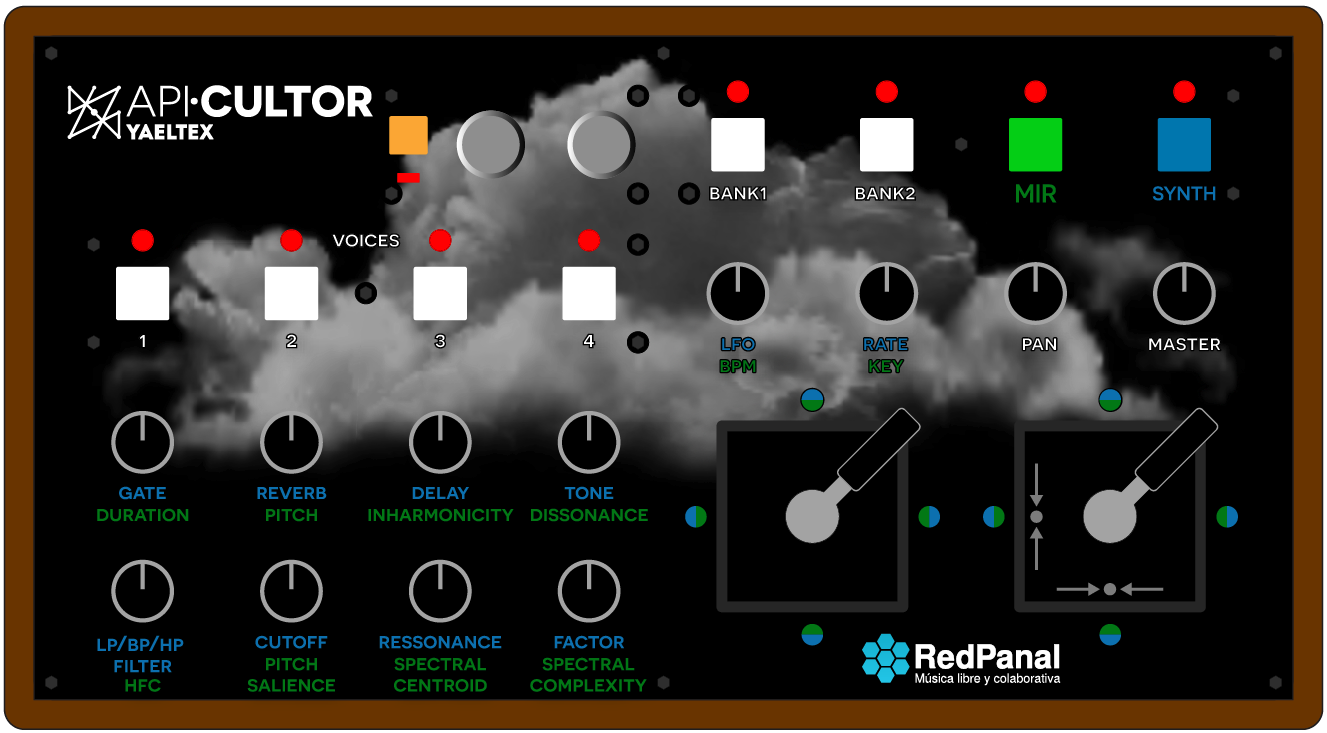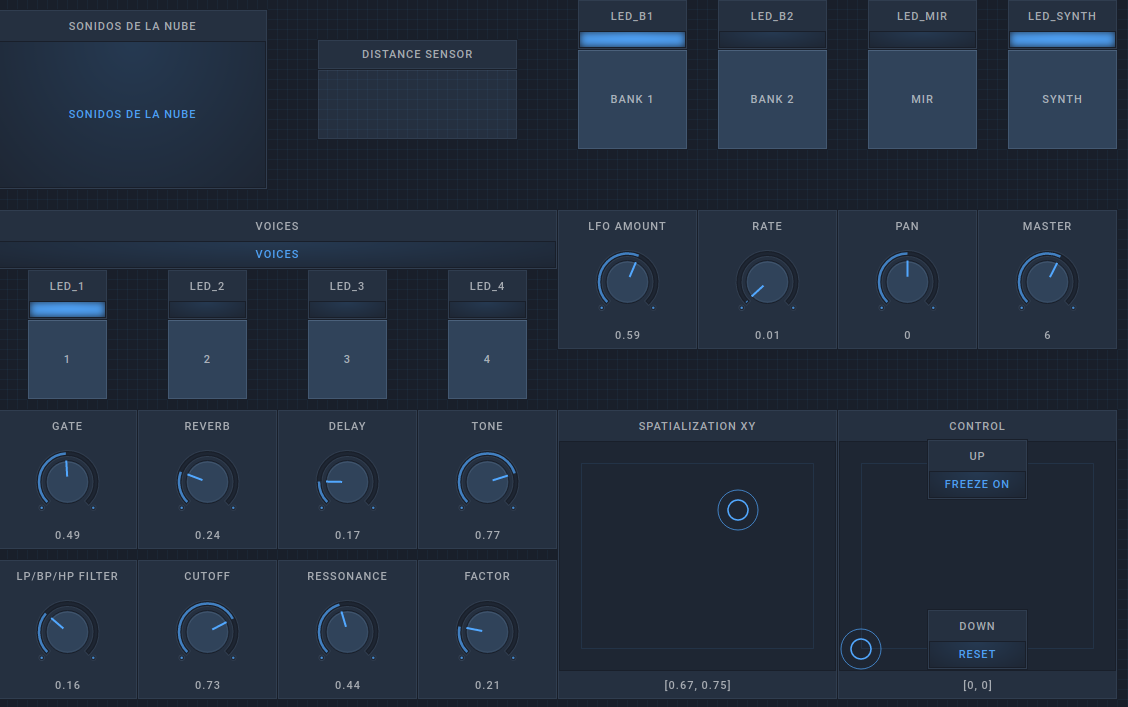APICultor Cloud Instrument
A modern, real-time sound synthesis system with OSC control and MIR-based sound selection.
Overview
The Cloud Instrument is a complete refactored and modernized version of the original APICultor cloud instrument. It provides real-time audio synthesis controlled via OSC (Open Sound Control) messages, with intelligent sound selection based on Music Information Retrieval (MIR) descriptors.
Key Features
- 🎵 Real-time Audio Synthesis - SuperCollider, Pyo, or Mock backends
- 🎛️ OSC Control Interface - Complete OSC message routing and handling
- 🎹 MIDI Controller Support - Yaeltex, Akai Midimix, and generic controllers
- 🔍 MIR-based Sound Selection - Search sounds by audio characteristics
- 🔌 Plugin Architecture - Modular, extensible component system
- ⚙️ Modern Configuration - JSON files with environment variable support
- 🧪 Comprehensive Testing - pytest-based test suite with mocks
- 📝 Full Type Safety - Complete type annotations for Python 3.8+
Quick Start
1. Installation
See INSTALL.md for detailed installation instructions.
Quick install:
# Install dependencies
pip install python-osc python-rtmidi librosa ffmpeg-python requests
# Optional: Install freesound-python
pip install "freesound-python @ git+https://github.com/MTG/freesound-python.git"
2. Configuration
Create a configuration file cloud_instrument_config.json:
{
"osc": {
"host": "127.0.0.1",
"port": 9001,
"enable_logging": true
},
"audio": {
"backend": "supercollider",
"sample_rate": 44100,
"buffer_size": 512
},
"midi": {
"enabled": true,
"virtual_port": true,
"client_name": "CloudInstrument"
},
"database": {
"default_provider": "freesound",
"freesound_api_key": "${FREESOUND_API_KEY}"
},
"enabled_modules": ["database"]
}
For Freesound API access, get your API key from Freesound APIv2.
3. Run the Application
Modern version (recommended):
python CloudInstrument_modern.py
Legacy version:
python CloudInstrument.py
With custom configuration:
python CloudInstrument_modern.py -c my_config.json
With command-line overrides:
python CloudInstrument_modern.py --osc-port 9002 --audio-backend pyo --no-midi
Architecture
Modern Architecture (2025 Refactor)
cloud_instrument/
├── core/ # Core application components
│ ├── application.py # Main app orchestrator
│ ├── config.py # Configuration management
│ ├── events.py # Event system
│ └── exceptions.py # Exception hierarchy
├── osc/ # OSC system
│ ├── server.py # OSC server + mock fallback
│ ├── handlers.py # Message routing & handling
│ └── messages.py # OSC message types
├── audio/ # Audio system
│ ├── manager.py # Audio coordinator
│ ├── backends.py # Audio server implementations
│ ├── effects.py # Audio effects
│ └── interfaces.py # Audio interfaces
├── midi/ # MIDI system
│ ├── manager.py # MIDI coordinator
│ ├── controllers.py # Hardware controller support
│ └── messages.py # MIDI message handling
└── tests/ # Modern test suite
├── test_config.py
└── test_osc.py
Key Improvements
| Aspect | Before (Legacy) | After (Modern) |
|---|---|---|
| Python Version | 2.7 | 3.8+ with type annotations |
| Architecture | Monolithic script | Modular, event-driven |
| Configuration | Hard-coded | Flexible JSON + environment variables |
| Error Handling | Basic | Comprehensive with graceful degradation |
| Testing | Minimal | pytest with mocks and fixtures |
| Documentation | Limited | Complete with examples |
Usage
OSC Messages
The Cloud Instrument responds to various OSC messages:
Audio Effects
/fx/volume [float] # Volume control (0.0-1.0)
/fx/pan [float] # Pan position (-1.0 to 1.0)
/fx/reverb [room_size, damping] # Reverb parameters
/fx/delay [time, feedback] # Delay effect
/fx/filter [freq, resonance, type] # Filter control
MIR Parameters
/mir/tempo [bpm] # Target tempo
/mir/centroid [hz] # Spectral centroid target
/mir/duration [seconds] # Target duration
/mir/hfc [value] # High frequency content
Sound Control
/sound/search [query] # Search sound database
/sound/play [id] # Play sound by ID
/sound/stop # Stop playback
System Control
/system/status # Get system status
/system/shutdown # Graceful shutdown
MIDI Controllers
Supported Controllers
Yaeltex Controller:
- Faders 0-7: Channel volumes
- Knob 16: Pan control
- Knobs 17-18: Reverb room/damping
- Knobs 19-20: Delay time/feedback
- Buttons: Play/Stop/Record
Akai Midimix:
- Track faders: Volume control
- Upper knobs: Pan, reverb
- Lower knobs: Delay, filter
- Buttons: Mute/Solo/Record per track
Generic Controllers:
- Configurable CC and note mappings
- Custom controller support
Audio Backends
SuperCollider
# Start SuperCollider first
sclang -D apicultor_synth.scd
Pyo
# Python-based audio processing
python CloudInstrument_modern.py --audio-backend pyo
Mock (Testing)
# No audio hardware required
python CloudInstrument_modern.py --audio-backend mock
User Interfaces
OpenStageControl UI
Load ui/apicultor-ui.json in OpenStageControl with OSC receiving port 7000.

MIDI Controllers
Yaeltex Custom Controller

Custom Yaeltex MIDI controllers provide dedicated hardware control.

Modes
MIR Mode:

Synth Mode:

Audio Processing Chain
Input → Effects Chain → Output
↓
freeze → vibrato → pan → pitch shift → filters → delay → reverb
Development
Testing
# Run test suite
pytest tests/ -v
# Run with coverage
pytest tests/ --cov=cloud_instrument --cov-report=html
# Test specific component
pytest tests/test_osc.py -v
Type Checking
mypy cloud_instrument/
Code Formatting
black cloud_instrument/
flake8 cloud_instrument/
Command Line Options
python CloudInstrument_modern.py --help
Options include:
-c, --config: Configuration file path--osc-host/--osc-port: OSC server settings--audio-backend: Audio backend choice--midi-device: MIDI device selection--no-midi: Disable MIDI-v, --verbose: Debug logging--status: Show system status--test-osc: Test OSC functionality
Environment Variables
Set environment variables for sensitive configuration:
export FREESOUND_API_KEY="your_api_key_here"
export APICULTOR_LOG_LEVEL="DEBUG"
Troubleshooting
Common Issues
OSC not working:
- Check if python-osc is installed:
pip install python-osc - Verify port is not in use:
netstat -an | grep 9001
MIDI not working:
- Install python-rtmidi:
pip install python-rtmidi - Check available MIDI devices:
python CloudInstrument_modern.py --status
Audio backend issues:
- SuperCollider: Ensure scsynth/sclang are in PATH
- Pyo: Install pyo:
pip install pyo - Use mock backend for testing:
--audio-backend mock
Logging
Enable debug logging for troubleshooting:
python CloudInstrument_modern.py --verbose
Or set in configuration:
{
"logging": {
"level": "DEBUG",
"file": "cloud_instrument.log"
}
}
Integration
APICultor Plugin System
The Cloud Instrument integrates with the APICultor plugin system:
from cloud_instrument import CloudInstrumentApp
app = CloudInstrumentApp("config.json")
app.run()
External Applications
Send OSC messages from any application:
from pythonosc.udp_client import SimpleUDPClient
client = SimpleUDPClient("127.0.0.1", 9001)
client.send_message("/fx/volume", 0.8)
Performance
Raspberry Pi Configuration
For optimal performance on Raspberry Pi:
# ~/.jackdrc
/usr/bin/jackd -P75 -t2000 -dalsa -dhw:S2 -p4096 -n7 -r44100 -s
Real-time Audio
Configure low-latency audio:
{
"audio": {
"sample_rate": 44100,
"buffer_size": 256,
"channels": 2
}
}
License
Free Software shared with GPL v3. See LICENSE.
Contributing
- Fork the repository
- Create a feature branch
- Add tests for new functionality
- Ensure all tests pass:
pytest tests/ - Submit a pull request